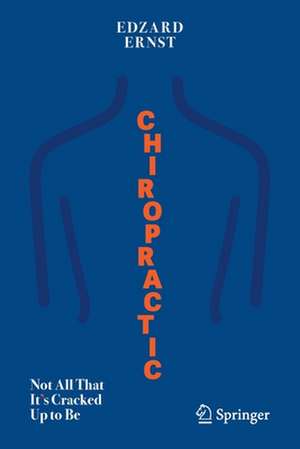Chiropractic: Not All That It's Cracked Up to Be
Autor Edzard Ernsten Limba Engleză Paperback – 15 aug 2020
Despite this high level of acceptance, chiropractic is wide open to criticism. The claims and assumptions made by chiropractors are far from evidence based. Chiropractic manipulations are of doubtful effectiveness and have regularly been associated with severe adverse effects, including multiple fatalities. The advice issued by chiropractors to patients and consumers is often less than responsible. The behaviour of chiropractors and their organisations is frequently less than professional.
This book presents and discusses recent evidence in and around chiropractic in a factual and unemotional manner. It amounts to an evidence-based critique of this profession and discloses the often dangerously misleading information published for the lay audience. It thereby contributes to advancing public health and critical thinking.
Preț: 196.38 lei
Preț vechi: 206.71 lei
-5% Nou
Puncte Express: 295
Preț estimativ în valută:
37.58€ • 39.24$ • 31.03£
37.58€ • 39.24$ • 31.03£
Carte disponibilă
Livrare economică 25 martie-08 aprilie
Preluare comenzi: 021 569.72.76
Specificații
ISBN-13: 9783030531171
ISBN-10: 3030531171
Pagini: 199
Ilustrații: VII, 199 p. 11 illus., 7 illus. in color.
Dimensiuni: 155 x 235 x 19 mm
Greutate: 0.3 kg
Ediția:1st ed. 2020
Editura: Springer International Publishing
Colecția Springer
Locul publicării:Cham, Switzerland
ISBN-10: 3030531171
Pagini: 199
Ilustrații: VII, 199 p. 11 illus., 7 illus. in color.
Dimensiuni: 155 x 235 x 19 mm
Greutate: 0.3 kg
Ediția:1st ed. 2020
Editura: Springer International Publishing
Colecția Springer
Locul publicării:Cham, Switzerland
Cuprins
The History of Chiropractic.- Popularity and Acceptance.- The Main Axiom of Chiropractic: Subluxation and Spinal Manipulation.- Other Modalities Used by Chiropractors.- Offshoots of Chiropractic.- Therapeutic Claims by Chiropractors.- Effectiveness of Spinal Manipulation.- Safety of Spinal Manipulation.- Education and Professionalism.- Ethical and Legal Issues.- Other Issues.- The Tricks of the Trade.- Glossary.
Notă biografică
Edzard Ernst was born in 1948 in Wiesbaden, Germany. He went to school in Germany and the US and studied psychology and medicine at the LM University in Munich. In 1977, he qualified as a physician in Germany where he also completed his MD and PhD theses.
He was Professor in Physical Medicine and Rehabilitation (PMR) at Hannover Medical School (Germany) and Head of the PMR Department at the University of Vienna (Austria). He came to the University of Exeter in 1993 to establish the world’s first Chair in complementary medicine. In 1999, he took British nationality. Since 2012, he is Emeritus Professor at the University of Exeter and now lives in Cambridge, UK as well as in Brittany, France.
Professor Ernst is/was founder/Editor-in-Chief of three medical journals (‘Focus on Alternative and Complementary Therapies’, ‘European Journal of Physical medicine and Rehabilitation’ and ‘Perfusion’). He has been a columnist for many publications (BMJ, GP, PJ, The Guardian, The Independent, The Spectator, etc.). His work has been awarded with 17 scientific awards (most recent: John Maddox Prize 2015 and Ockham Award 2017) and two Visiting Professorships (Canada and USA). He served on the ‘Medicines Commission’ of the British ‘Medicines and Healthcare Products Regulatory Agency’ (1994 – 2005).
He was Professor in Physical Medicine and Rehabilitation (PMR) at Hannover Medical School (Germany) and Head of the PMR Department at the University of Vienna (Austria). He came to the University of Exeter in 1993 to establish the world’s first Chair in complementary medicine. In 1999, he took British nationality. Since 2012, he is Emeritus Professor at the University of Exeter and now lives in Cambridge, UK as well as in Brittany, France.
Professor Ernst is/was founder/Editor-in-Chief of three medical journals (‘Focus on Alternative and Complementary Therapies’, ‘European Journal of Physical medicine and Rehabilitation’ and ‘Perfusion’). He has been a columnist for many publications (BMJ, GP, PJ, The Guardian, The Independent, The Spectator, etc.). His work has been awarded with 17 scientific awards (most recent: John Maddox Prize 2015 and Ockham Award 2017) and two Visiting Professorships (Canada and USA). He served on the ‘Medicines Commission’ of the British ‘Medicines and Healthcare Products Regulatory Agency’ (1994 – 2005).
Textul de pe ultima copertă
Of all forms of alternative medicine, chiropractic is the one that is most generally accepted. In the UK, for instance, chiropractors are regulated by statute and even have their own ‘Royal College of Chiropractic’. In the US, chiropractic’s country of origin, most chiropractors carry the title ‘doctor’ and many consumers believe they are medically trained.
Despite this high level of acceptance, chiropractic is wide open to criticism. The claims and assumptions made by chiropractors are far from evidence based. Chiropractic manipulations are of doubtful effectiveness and have regularly been associated with severe adverse effects, including multiple fatalities. The advice issued by chiropractors to patients and consumers is often less than responsible. The behaviour of chiropractors and their organisations is frequently less than professional.
This book presents and discusses recent evidence in and around chiropractic in a factual and unemotional manner. It amounts to an evidence-based critique of this profession and discloses the often dangerously misleading information published for the lay audience. It thereby contributes to advancing public health and critical thinking.
Despite this high level of acceptance, chiropractic is wide open to criticism. The claims and assumptions made by chiropractors are far from evidence based. Chiropractic manipulations are of doubtful effectiveness and have regularly been associated with severe adverse effects, including multiple fatalities. The advice issued by chiropractors to patients and consumers is often less than responsible. The behaviour of chiropractors and their organisations is frequently less than professional.
This book presents and discusses recent evidence in and around chiropractic in a factual and unemotional manner. It amounts to an evidence-based critique of this profession and discloses the often dangerously misleading information published for the lay audience. It thereby contributes to advancing public health and critical thinking.
Caracteristici
Essential reading for all patients considering chiropractic treatment A thorough evidence-based investigation, factual and free of emotion Serves as a model for critical thinking in the context of healthcare
